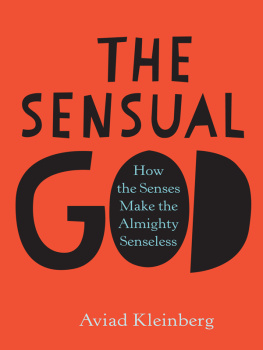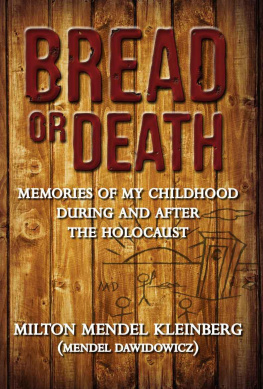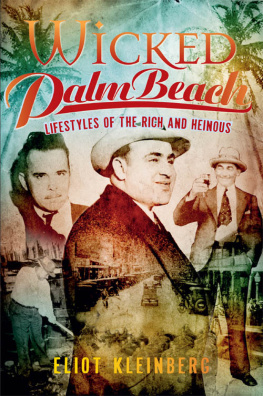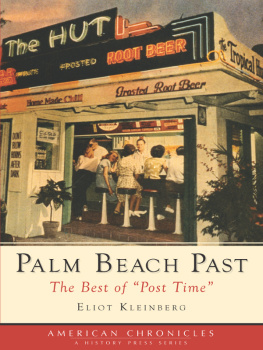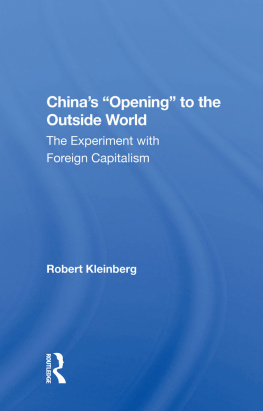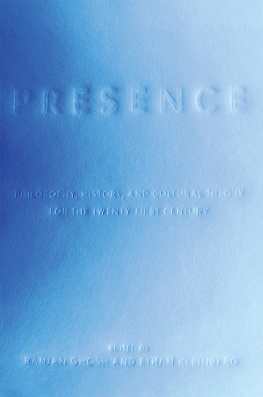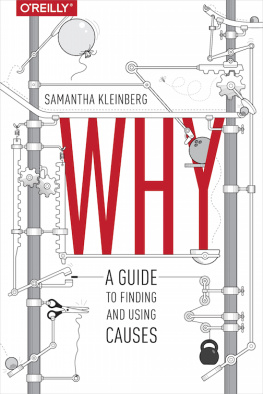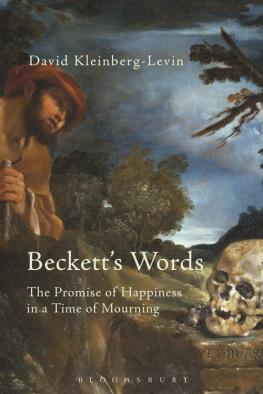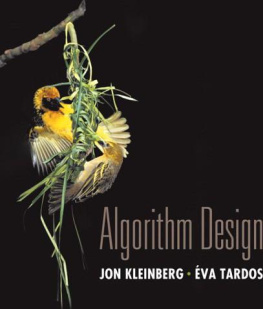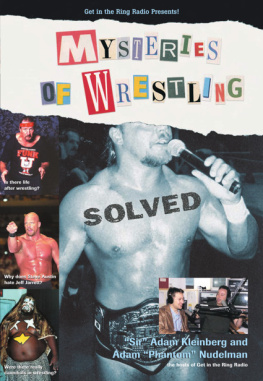Kleinberg - Haunting History
Here you can read online Kleinberg - Haunting History full text of the book (entire story) in english for free. Download pdf and epub, get meaning, cover and reviews about this ebook. year: 2017, publisher: Stanford University Press, genre: Religion. Description of the work, (preface) as well as reviews are available. Best literature library LitArk.com created for fans of good reading and offers a wide selection of genres:
Romance novel
Science fiction
Adventure
Detective
Science
History
Home and family
Prose
Art
Politics
Computer
Non-fiction
Religion
Business
Children
Humor
Choose a favorite category and find really read worthwhile books. Enjoy immersion in the world of imagination, feel the emotions of the characters or learn something new for yourself, make an fascinating discovery.

Haunting History: summary, description and annotation
We offer to read an annotation, description, summary or preface (depends on what the author of the book "Haunting History" wrote himself). If you haven't found the necessary information about the book — write in the comments, we will try to find it.
Kleinberg: author's other books
Who wrote Haunting History? Find out the surname, the name of the author of the book and a list of all author's works by series.
Haunting History — read online for free the complete book (whole text) full work
Below is the text of the book, divided by pages. System saving the place of the last page read, allows you to conveniently read the book "Haunting History" online for free, without having to search again every time where you left off. Put a bookmark, and you can go to the page where you finished reading at any time.
Font size:
Interval:
Bookmark:
MERIDIAN
Crossing Aesthetics
Werner Hamacher
Editor
HAUNTING HISTORY
For a Deconstructive Approach to the Past
Ethan Kleinberg
Stanford University Press
Stanford California 2017
Stanford University Press
Stanford, California
2017 by the Board of Trustees of the Leland Stanford Junior University. All rights reserved.
No part of this book may be reproduced or transmitted in any form or by any means, electronic or mechanical, including photocopying and recording, or in any information storage or retrieval system without the prior written permission of Stanford University Press.
Printed in the United States of America on acid-free, archival-quality paper
Library of Congress Cataloging-in-Publication Data
Names: Kleinberg, Ethan, 1967 author.
Title: Haunting history : for a deconstructive approach to the past / Ethan Kleinberg.
Other titles: Meridian (Stanford, Calif.)
Description: Stanford, California : Stanford University Press, 2017. | Series: Meridian: crossing aesthetics | Includes bibliographical references and index.
Identifiers: LCCN 2016057432| ISBN 9781503602373 (cloth : alk. paper) | ISBN 9781503603387 (pbk. : alk. paper) | ISBN 9781503603424 (e-book)
Subjects: LCSH: HistoryPhilosophy. | HistoryMethodology. | Historiography. | Deconstruction.
Classification: LCC D16.8 .K495 2017 | DDC 901dc23
LC record available at https://lccn.loc.gov/2016057432
Contents
Acknowledgments
The completion of this manuscript was facilitated by grants from the Colonel Return Jonathan Meigs Fund, the cole des hautes tudes en sciences sociales, and support from Wesleyan University. I also want to thank Berber Bevernage and the International Network for the Theory of History for inviting me to present a plenary address that eventually became . I benefited enormously from conversations and support from my colleagues in the College of Letters and the History Department at Wesleyan, as well as the faculty, students, and postdoctoral fellows at our Center for the Humanities. I couldnt have completed the book without the help of Erinn Savage. I owe a special debt to my colleagues at History and Theory: Brian Fay, Philip Pomper, William Vijay Pinch, Richard Vann, Laura Stark, Matthew Specter, Julie Perkins, and especially David Gary Shaw. Carolyn Dean, Peter Gordon, Nitzan Lebovic, Jeffery Andrew Barash, Adam Tooze, Judith Surkis, Sandrine Sanos, Martin Hgglund, Hans-Ulrich Gumbrecht, Berel Lang, Frank Ankersmit, Jrn Rsen, Eelco Runia, Allan Megill, Gabrielle Spiegel, and Michael Roth all offered excellent counsel, challenges, and advice. Special thanks are in order to Dominick LaCapra and Hayden White for their inspiration and guidance. Werner Hamacher challenged me to think more carefully and more adventurously throughout this project, and I cannot thank him enough for the time and care he gave to the manuscript. I also owe a huge debt of gratitude to Emily-Jane Cohen and the editorial staff at Stanford University Press, as well as the anonymous readers.
Last, I want to express my love and gratitude to my friends and family. My daughters Lili and Noa give me inspiration every day and the love of my life, Tracy, fills me with energy and joy. I dedicate this book to my mother and father, Irene and Marvin Kleinberg. They instilled in me a love of learning and intellectual curiosity for which I am forever grateful. This book is for both of you.
Introduction
Like the ghost, this book is an interruption, a provocation, an unsettling of the orderly boundaries and lines by which we conventionally think about the relation between past and present and thus the way we do history. In it I conjure the specter of deconstruction to advocate for a reevaluation of these boundaries and our strategies for thinking and writing about the past. Deconstruction is a spirit that has haunted and frightened the historical profession, as we will see in , but, practically speaking, very few historians have attempted a serious engagement with Derrida or deconstruction for the practice of history. To my mind there are two main reasons for this: one that is inherent to current dominant historical practices and another that is announced explicitly as the reason deconstruction is inappropriate for the practice and writing of history.
The first reason is that most conventional historians are what I refer to as ontological realists. I define ontological realism as a commitment to history as an endeavor concerned with events assigned to a specific location in space and time that are in principle observable and as such are regarded as fixed and immutable. Here the historian accepts that there is a possibility for epistemological uncertainty about our understanding of a past event, but this is mitigated by the ontological certainty that the event happened in a certain way at a certain time. Central to this position is a commitment to empirical data that serve as something of a false floor to hold it. In the end, getting the past right is a question of historical method. We will explore the workings and repercussions of ontological realism in position that there is a past and we can have full access to it. To my mind, this is a position that no, or very few, working historians currently hold. Instead, it is the weaker variant that I wish to target, wherein the past is said to have an ontological reality that we can only approach from limited perspective and incompletely from our position in the present and thus with epistemological uncertainty about that which is ontologically certain. This latter, weaker variant, I argue, is the position that most conventional historians hold, but I also want to suggest that the stronger version is always at work unannounced in the weaker one.
The error of ontological realism is that it fails to recognize the limitations of our own historical horizons, the extent to which our personal perspective is determined and directed by our past. The current epistemological understanding of the past is taken to be the ontological reality of the past. It is this indifference to the epistemological understanding that allows one to take our historically contingent mode of understanding as indicative of a method that is universally valid for all time. And it is here that we can see the ways that the current attempted rapprochement between our historical methods and our historical condition is predicated on a misunderstanding of our current practices as contained within a permanently enduring present that fosters a similarly misconceived representation of a permanently enduring past.
But what holds the ontological certainty of the past event given the possibility of epistemological uncertainty in recounting that event? Most conventional historians either avoid or defer this question, working purely on the assumption that method is sufficient to bring the past into the present. But the past itself has no ontological properties, or if it does, it has a latent ontology; thus, the past event cannot be made present. Any reappearance is the untimely visitation of a ghost. This leads to a more troubling question about the category of ontology itself and specifically the ontology or hauntology of the past. Hauntology is a Derridean term that relies on the sonic affinity between ontology and hauntology that the concept of hauntology haunts by replacing (when spoken, ontologie and hontologie are indistinguishable in French). History, too, is a replacing of this sort where the past event or figure is silently determined by the telling that replaces it. But the telling in the present is haunted by the ghost of the past, which is neither present nor absent, neither here nor gone. This disjunction or disruption at the core of history exposes the ways that origins and grounds are always posited to determine the beginning from the point of view of the end, thus smuggling both a teleology and rigidity into the account. Conventional historians give the past event the ontological reality of a fixed and permanent object silently replacing the spectral status with a fleshly one, but the ontological properties of the past event are constructed by the historian in the present.
Next pageFont size:
Interval:
Bookmark:
Similar books «Haunting History»
Look at similar books to Haunting History. We have selected literature similar in name and meaning in the hope of providing readers with more options to find new, interesting, not yet read works.
Discussion, reviews of the book Haunting History and just readers' own opinions. Leave your comments, write what you think about the work, its meaning or the main characters. Specify what exactly you liked and what you didn't like, and why you think so.

